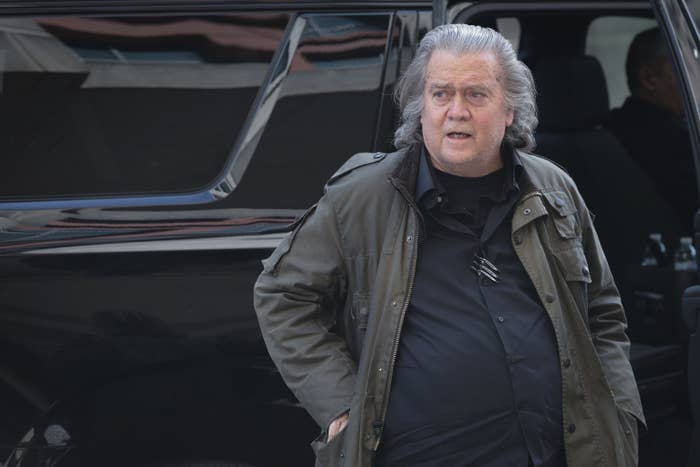
WASHINGTON — Former president Donald Trump’s longtime adviser Steve Bannon can’t argue as a defense that he was relying on his lawyer’s advice when he refused to comply with subpoenas from the congressional committee investigating Jan. 6, a federal judge ruled Wednesday.
Bannon is facing a two-count indictment for failing to comply with the committee’s subpoenas for documents and testimony; both charges are misdemeanors carrying a maximum sentence of one year in prison and a minimum penalty of 30 days behind bars. A jury trial is set for July 18.
Bannon’s lawyer Robert Costello had cited Trump’s assertion of executive privilege when he notified the Jan. 6 committee in October that Bannon wouldn’t turn over records or appear for a deposition. Prosecutors handling the criminal case against Bannon filed a preemptive motion arguing that he shouldn’t be allowed to introduce evidence or argue at trial that he’d relied in “good faith” on the advice of his lawyer.
US District Judge Carl Nichols agreed with prosecutors that a binding 1961 decision from the US Court of Appeals for the DC Circuit, Licavoli v. United States, held that an advice-of-counsel defense wasn’t allowed in a case involving the same charge that Bannon faces. Bannon’s lawyers attempted to argue that the DC Circuit decision wasn’t exactly on point because it didn’t involve an executive privilege claim, but Nichols found that those types of underlying circumstances didn’t make a difference.
Bannon will have other opportunities to challenge the prosecution before the July trial. He’s expected to file a motion to dismiss the case altogether soon. That filing was due by the end of this week, but Bannon’s legal team recently requested an extension until early May; Nichols on Wednesday agreed to extend the deadline, but only by a week.
During arguments before Nichols last month, Assistant US Attorney Amanda Vaughn argued that the charges against Bannon were simply about whether or not he “showed up,” and that allowing Bannon to lean on his lawyer’s advice as a defense would effectively mean that Congress had no subpoena power at all — “The summoned witness doesn’t get to decide if Congress can make them show up,” she said.
Bannon’s lawyers argued that in the decades since the 1961 DC Circuit decision at issue, the US Supreme Court had raised the bar for what it took for the government to prove a defendant “willfully” committed certain types of crimes, and those undermined the DC Circuit’s analysis. Beyond that, Bannon attorney David Schoen told Nichols that he believed their best argument was that the executive privilege element set Bannon’s case apart and raised separation of powers issues that weren’t part of the analysis in Licavoli.
Nichols had ruled during the March hearing that he was bound to apply Licavoli, notwithstanding Supreme Court decisions that didn’t involve the specific charge at issue in Bannon’s case. He gave the parties more time to address the executive privilege issue, but ultimately found it didn’t change the standard for the government to prove Bannon’s state of mind when he failed to comply with the subpoenas.
Nichols noted that if Licavoli wasn’t on the books, he might have sided with Bannon, but as a lower court judge he didn’t have the power to ignore binding precedent.
Schoen did not immediately return a request for comment.
Bannon is the only person to face criminal charges so far for defying Jan. 6 committee subpoenas. The House voted in December to find Trump’s former chief of staff Mark Meadows in contempt for refusing to fully comply with a subpoena; DOJ officials have not announced whether they’ll pursue criminal charges.
The House is set to vote Wednesday on whether to hold two more former top Trump advisers, Peter Navarro and Dan Scavino, in contempt.

